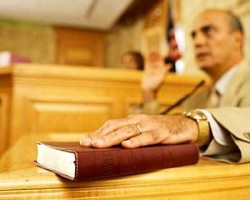
JAMES McCAMPBELL, Appellant,
v.
FEDERAL NATIONAL MORTGAGE ASSOCIATION, Appellee.
Mark P. Stopa of Stopa Law Firm, Tampa, for Appellant.
Robert R. Edwards of Choice Legal Group, P.A., Fort Lauderdale, for Appellee.
CASANUEVA, Judge.
In this appeal from a final judgment of foreclosure, James McCampbell contends that the trial court erred in admitting copies of his loan modification agreement, and Federal National Mortgage Association (Fannie Mae) correctly concedes that the admission of the copies was improper. Accordingly, we reverse.[1]
On October 26, 2007, Mr. McCampbell signed the original mortgage and promissory note on the property, and on July 14, 2010, an agreement modifying the original loan and all of the original loan documents was executed. At trial, Fannie Mae called one witness to testify and that witness did not produce the original loan modification agreement nor did the witness explain its absence. Rather, Fannie Mae sought the admission of a copy of the agreement. Over objection, the trial court admitted the copy.
We hold that the trial court erred in admitting a copy of the document and remand for a new trial. Section 90.952, Florida Statutes (2012), provides as follows: “Except as otherwise provided by statute, an original writing . . . is required in order to prove the contents of the writing. . . .” In Rattigan v. Central Mortgage Co., 199 So. 3d 966, 967 (Fla. 4th DCA 2016), a similar failure resulted in a reversal of a foreclosure judgment. In that case, the bank, as here, was proceeding under a modified loan. The Fourth District noted:
When the terms of an agreement are necessary for resolution of an issue brought before a court, the failure to introduce the agreement itself into evidence violates the best evidence rule.
. . . .
This written modification was as much a part of the parties’ agreement as the original note itself. The Bank violated the best evidence rule by virtue of its failure to introduce the modification at trial (either the original or a duplicate with an explanation as to why the original note was unavailable, see Deutsche Bank Nat’l Tr. Co. v. Clarke, 87 So. 3d 58, 62 (Fla. 4th DCA 2012)). Id. (citing J.H. v. State, 480 So. 2d 680, 682 (Fla. 1st DCA 1985)). As a result, the admission of testimony regarding the content of the modification was error. Here, the identical failure to admit the modification agreement took place and resulted in the identical evidentiary error. See also Mathis v. Nationstar Mortg., LLC, 227 So. 3d 189, 193 (Fla. 2d DCA 2017) (holding that where bank’s witness did not provide any explanation regarding why the original allonge was not available, the “testimony regarding the contents of the allonge was inadmissible under the best evidence rule”).
We reverse and remand for a new trial. See Heller v. Bank of Am., NA, 209 So. 3d 641, 645 (Fla. 2d DCA 2017) (reversing and remanding final judgment of foreclosure for a new trial where trial court improperly allowed the bank’s witness to give hearsay testimony regarding content of business records which had not been admitted into evidence).
Reversed and remanded.
SALARIO and BADALAMENTI, JJ., Concur.
NOT FINAL UNTIL TIME EXPIRES TO FILE REHEARING MOTION AND, IF FILED, DETERMINED.
[1] We do not find merit in Fannie Mae’s argument that the appeal should be affirmed based on the tipsy coachman doctrine because, although the trial court took judicial notice of certain bankruptcy pleadings, no other pleading accompanied the judicial notice request.
© 2010-19 FORECLOSURE FRAUD | by DinSFLA. All rights reserved.


